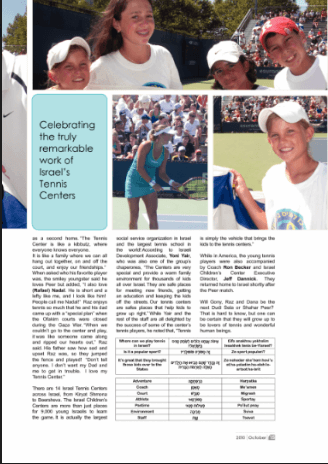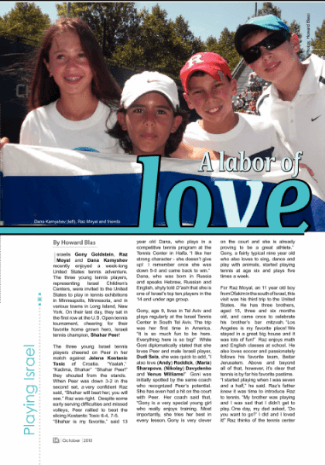Original Article Published On The Jerusalem Post
Israelis Gony Goldstein, Raz Moyal and Dana Kamyshev recently enjoyed a week-long United States tennis adventure. The three young tennis players, representing Israel Children’s Centers, were invited to the United States to play in tennis exhibitions in Minneapolis, Minnesota, and in various towns in Long Island, New York. On their last day, they sat in the first row at the U.S. Open tennis tournament, cheering for their favorite home grown hero, Israeli tennis champion, Shahar Peer!
The three young Israel tennis players cheered on Peer in her match against Jelena Kostanic Tosic of Croatia. Yaalah, Kadima, Shahar Shahar Peer! they shouted from the stands. When Peer was down 3-2 in the second set, a very confident Raz said, Shahar will beat her; you will see. Raz was right. Despite some early serving difficulties and missed volleys, Peer rallied to beat the slicing Kostantic Tosic 6-4, 7-5. Shahar is my favorite, said 13 year old Dana, who plays in a competitive tennis program at the Tennis Center in Haifa. “I like her strong character – she doesn’t give up! I remember once she was down 5-0 and came back to win. Dana, who was born in Russia and speaks Hebrew, Russian and English, shyly told Dash that she is one of Israel’s top ten players in the 14 and under age group.
Gony, age 9, lives in Tel Aviv and plays regularly at the Israel Tennis Center in South Tel Aviv. The trip was her first time in America. It is so much fun to be here. Everything here is so big! While Gony diplomatically stated that she loves Peer and male Israeli player, Dudi Sela, she was quick to add, I also love (Andy) Roddick, (Maria) Sharapova, (Nikolay) Davydenko and Venus Williams! Gony was initially spotted by the same coach who recognized Peer’s potential. She has even had a hit on the court with Peer. Her coach said that, Gony is a very special young girl who really enjoys training. Most importantly, she tries her best in every lesson. Gony is very clever on the court and she is already proving to be a great athlete. Gony, a fairly typical nine year old who also loves to sing, dance and play with animals, started playing tennis at age six and plays five times a week.
For Raz Moyal, an 11 year old boy from Ofakim in the south of Israel, this visit was his third trip to the United States. He has three brothers, aged 15, three and six months old, and came once to celebrate his brother’s bar mitzvah. Los Angeles is my favorite place! We stayed in a great big house and it was lots of fun! passionately follows his favorite team, Beitar Jerusalem. Above and beyond all of that, however, it’s clear that tennis is by far his favorite pastime. I started playing when I was seven and a half, he said. Raz’s father knew it was time to introduce Raz to tennis. My brother was playing and I was sad that I didn’t get to play. One day, my dad asked, Do you want to go? I did and I loved it! Raz thinks of the tennis center as a second home. The Tennis Center is like a kibbutz, where everyone knows everyone.
It is like a family where we can all hang out together, on and off the court, and enjoy our friendships. When asked who his favorite player was, the smiley youngster said he loves Peer but added, I also love (Rafael) Nadal. He is short and a lefty like me, and I look like him! People call me Nadal! Raz enjoys tennis so much that he and his dad came up with a special plan when the Ofakim courts were closed during the Gaza War. When we couldn’t go to the center and play, it was like someone came along and ripped our hearts out, Raz said. His father saw how sad and upset Raz was, so they jumped the fence and played! Don’t tell anyone. I don’t want my Dad and me to get in trouble. I love my Tennis Center.

There are 14 Israel Tennis Centers across Israel, from Kiryat Shmona to Beersheva. The Israel Children’s Centers are more than just places for 9,000 young Israelis to learn the game. It is actually the largest social service organization in Israel and the largest tennis school in the world! According to Israeli Development Associate, Yoni Yair, who was also one of the groups chaperones, The Centers are very special and provide a warm family environment for thousands of kids all over Israel. They are safe places for meeting new friends, getting an education and keeping the kids off the streets. Our tennis centers are safe places that help kids to grow up right. While Yair and the rest of the staff are all delighted by the success of some of the centers tennis players, he noted that, “Tennis is simply the vehicle that brings the kids to the tennis centers. While in America, the young tennis players were also accompanied by Coach Ron Becker and Israel Children’s Center Executive Director, Jeff Dannick. They returned home to Israel shortly after the Peer match.
Will Gony, Raz and Dana be the next Dudi Sela or Shahar Peer? That is hard to know, but one can be certain that they will grow up to be lovers of tennis and wonderful human beings.



